Introduction to Ramzan
Ramzan, also known as Ramadan, is the ninth month of the Islamic lunar calendar and is revered by Muslims worldwide as a time of fasting, prayer, reflection, and community. This holy month holds profound significance as it commemorates the first revelation of the Quran to the Prophet Muhammad. During Ramzan, Muslims engage in fasting from dawn until sunset, a practice known as Sawm, which is one of the Five Pillars of Islam. Fasting during this holy period is not merely an exercise in abstention from food and drink; it is a means of spiritual growth, self-discipline, and empathy towards the less fortunate.
The rituals of Ramzan encompass various acts of worship and community involvement. Each day begins with a pre-dawn meal called Suhoor, which is followed by the fast starting at dawn (Fajr). The fast is broken at sunset (Maghrib) with a meal called Iftar, often initiated by eating dates and drinking water, in accordance with tradition. These moments encourage Muslims to gather with family and friends, fostering community bonds and a spirit of charity. Ramzan is also marked by increased prayer, particularly with the nightly Taraweeh prayers, which involve reciting portions of the Quran and reflecting on its teachings.
Having a structured timetable during Ramzan is essential for observant Muslims. A well-organized time table helps individuals manage their daily routines, including meal preparations, prayers, and other acts of worship. It ensures that they can fulfill their religious obligations while maintaining a healthy balance in their lives throughout the month. The significance of this timetable extends beyond mere logistics; it serves as a roadmap for spiritual growth and a deeper commitment to Islamic practices during this sacred period. Engaging fully in the rituals of Ramzan encourages believers to cultivate a stronger connection with their faith and the community around them.
Ramzan Time Table Calender Cdr 2025
Understanding the Ramzan Calendar
The Ramzan calendar is fundamentally based on the lunar calendar system, which consists of twelve months and is approximately 354 days long. In Islamic tradition, the month of Ramzan, or Ramadan, is the ninth month of this calendar and holds great significance as a period of fasting, reflection, and spirituality for millions of Muslims around the world. The beginning of Ramzan is determined by the sighting of the new moon, marking a critical aspect of how the calendar operates.
The process of moon sighting varies globally, with some communities relying on local sightings while others adhere to a more unified, global sighting practice. This variance can lead to different countries starting Ramzan on different days due to the moon’s visibility, creating a small degree of dissonance in the observance of this sacred month. Consequently, understanding the context of local versus global calendars is vital for keeping track of the Ramzan time table.
In relation to the Ramzan calendar, the term “Hijri” refers to the Islamic calendar, which began in 622 AD when the Prophet Muhammad migrated from Mecca to Medina. The Hijri calendar is also lunar-based, meaning it does not align perfectly with the Gregorian solar calendar and leads to the observation of Ramzan shifting by approximately ten to twelve days each year. This results in Ramzan being experienced in various seasons over the years, impacting the daily fasting routines, as it occurs in both summer heat and winter chill at different times.
Overall, understanding the structure and principles of the Ramzan calendar enhances one’s perspective on the importance of this month. It brings to light the nuances associated with lunar practices, local and global observances, and the significance of the Hijri date in marking this revered time in the Islamic faith.
Ramzan Time Table Calender Cdr 2025
Ramzan Time Table for 2025
The observance of Ramzan, also referred to as Ramadan, is an integral part of the Islamic faith, characterized by a month of fasting, prayer, and reflection. For the year 2025, it is anticipated that Ramzan will commence on the evening of March 10, 2025, and will conclude on the evening of April 9, 2025. This period is marked by fasting from dawn until dusk, during which Muslims refrain from eating and drinking. It is essential to note that the start and end dates of Ramzan may vary slightly based on moon sighting, hence it is advisable for individuals to confirm the precise dates within their respective communities.
During Ramzan, daily routines change significantly, as Muslims engage in pre-dawn meals known as Suhoor and evening meals called Iftar to break their fast. The timings for these meals are determined by local sunset and dawn timings, resulting in variations across geographical locations. For example, cities situated at more northern latitudes may observe longer fasting hours in comparison to those located closer to the equator. This year, Suhoor is expected to occur around 4:30 AM in some regions, while Iftar may take place at around 6:45 PM, depending on local sunset times.
For accurate Ramzan timings specific to various regions, many communities and mosques provide updated schedules that reflect local conditions. Websites and mobile applications related to Islamic practices also offer easy access to these timings based upon the user’s location. Therefore, it is crucial for individuals observing Ramzan to stay informed about their localized Suhoor and Iftar timings, thereby ensuring a spiritually fulfilling experience during this blessed month.
Ramzan Time Table Calender Cdr 2025
Tips for Observing Fasting During Ramzan
Observing fasting during Ramzan can be a spiritually rewarding experience, but it also requires careful planning and preparation to maintain physical well-being throughout the month. Here are some practical tips to help you navigate this sacred period effectively.
Planning meals for Suhoor and Iftar is essential. Suhoor, the pre-dawn meal, should be nutritious and filling, focusing on complex carbohydrates, healthy fats, and proteins to sustain energy levels throughout the day. Foods such as whole grains, oats, nuts, and yogurt provide lasting energy and help keep hunger at bay. Hydration is also critical; aim to drink plenty of water during Suhoor to minimize thirst during fasting hours.
For Iftar, break your fast with dates and water, followed by a balanced meal that includes protein, vegetables, and starches. It is essential to resist the temptation to indulge in greasy or overly sweet foods, as these can lead to sluggishness and digestive discomfort. Instead, prioritize wholesome ingredients that will replenish your energy and hydration levels effectively.
During fasting, maintaining energy levels can be a challenge, particularly in the mid-afternoon when fatigue may set in. Engage in light physical activities, such as walking or stretching, to enhance blood circulation without exhausting yourself. Avoid lengthy exposure to heat and try to stay in a cool environment as much as possible.
Common challenges faced while fasting include feelings of lethargy, headaches, or irritability. If you experience headaches, it could be due to dehydration or caffeine withdrawal. Gradually reducing caffeine intake before Ramzan can help alleviate such symptoms. To combat lethargy, break your fast with smaller portions and give your body time to adjust before consuming larger meals.
Staying organized and proactive about meal planning, hydration, and general well-being will make the fasting experience during Ramzan more fulfilling and manageable. Keeping these strategies in mind will enhance both your spiritual journey and physical health throughout this sacred month.
Ramzan Time Table Calender Cdr 2025
Conclusion and Benefits of Following the Ramzan Time Table
In the observance of Ramzan, adhering to a structured timetable is of paramount importance for Muslims around the world. A Ramzan timetable not only provides specific times for Suhoor (pre-dawn meal) and Iftar (meal to break the fast) but also helps in organizing daily prayers and acts of worship. By following this timetable, individuals can enhance their spiritual practice, ensuring that the month of fasting is both purposeful and reflective.
One of the most significant benefits of a Ramzan timetable is the fostering of a sense of community among Muslims. When communities follow a unified schedule for breaking fast and engaging in prayers, it encourages a communal spirit. This shared experience strengthens bonds amongst family, friends, and fellow worshippers. The collective observance of Ramzan rituals helps cultivate empathy and understanding, as individuals come together in prayer and reflection. Participation in communal activities also unleashes a feeling of belonging, which is essential for a healthy spiritual and emotional state.
Moreover, following a structured timetable facilitates improved time management. The month of Ramzan often brings a host of activities, from increased religious obligations to community engagement. The clear delineation of times for different activities allows individuals to allocate their time efficiently, preventing feelings of chaos or fatigue. This organization can lead to a more meaningful observance of the fast, enabling individuals to fully immerse themselves in acts of worship, reflection, and charitable deeds.
Lastly, adherence to a Ramzan timetable can significantly strengthen one’s faith. By consistently practicing rituals and focusing on spiritual growth, individuals may find themselves developing a deeper connection to their beliefs. This deepening of faith is not just beneficial for the individual; it also positively impacts those around them, encouraging a culture of spirituality and devotion within the community.

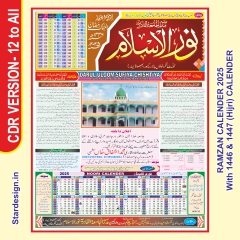
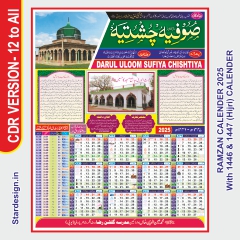

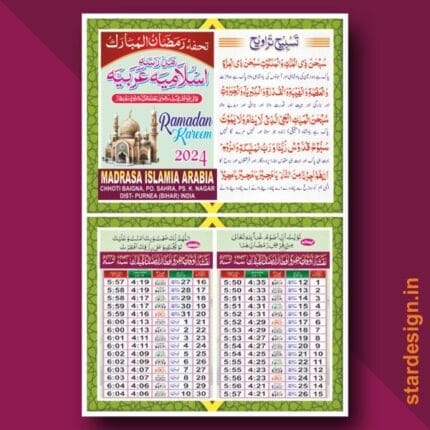
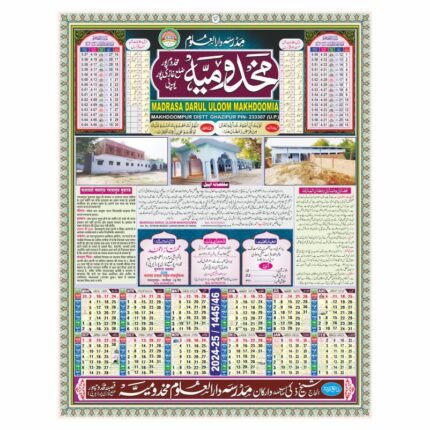
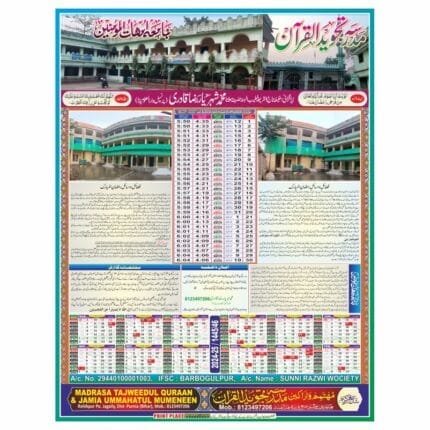

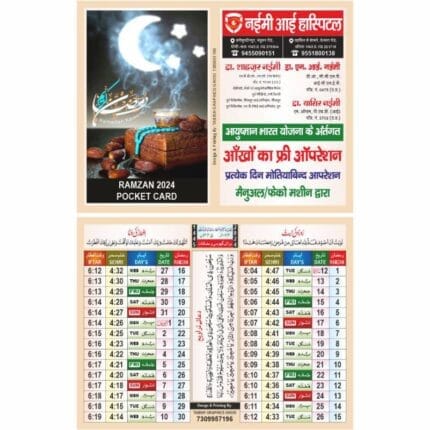
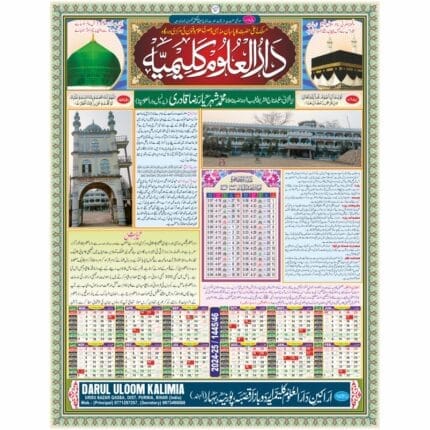



Reviews
There are no reviews yet.